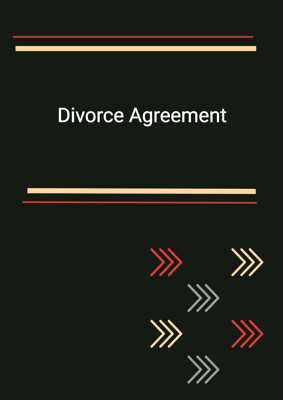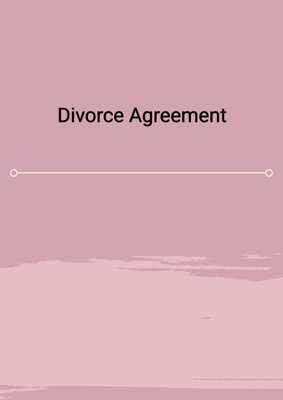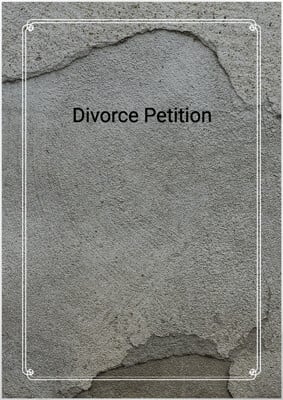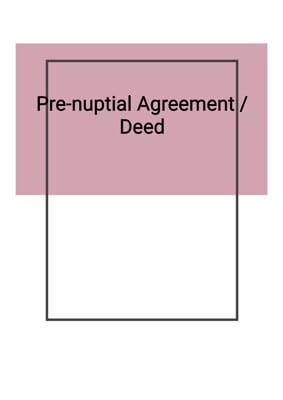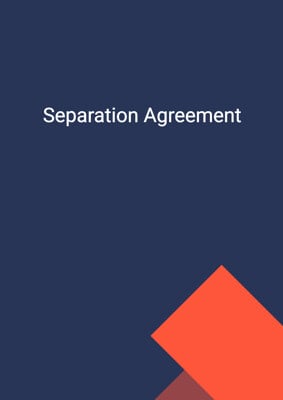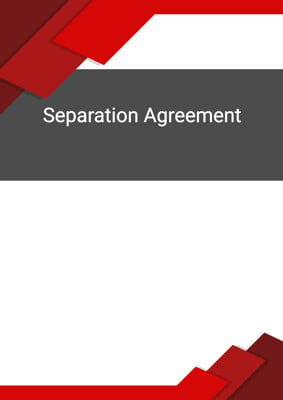How to Tailor the Document for Your Need?
01
Create Document
Fill in the details of the parties. You can click the "Fill with Member’s Information" button to complete it with information saved to your account.
02
Fill Information
Please fill in any additional information by following the step-by-step guide on the left hand side of the preview document and click the "Next" button.
03
Get Document
When you are done, click the "Get Document" button and you can download the document in Word or PDF format.
04
Review Document
Please get all parties to review the document carefully and make any final modifications to ensure that the details are correct before signing the document.
Document Preview
Document Description
The Pre-nuptial Agreement / Deed is a legal document that is made in contemplation of and is conditional upon the intended marriage of Party 1 and Party 2. It is designed to set out the wishes and intentions of the parties regarding their finances and property in order to avoid acrimonious and costly litigation in the event of the breakdown of the marriage. The agreement is binding on both parties and should be given the fullest effect as permitted by law, although it may not be enforceable in certain jurisdictions or may require legal representation.
The document begins with a preamble that outlines the purpose and background of the agreement. It states that the parties are entering into the agreement to preserve the interests of the person who currently owns or will subsequently receive any interest in the property. The preamble also acknowledges that the agreement may not be binding under the laws of certain jurisdictions or in any jurisdiction or court in which the parties may divorce in the future.
The agreement then proceeds to define various terms used throughout the document, such as 'breakdown of marriage', 'custody', 'property', and 'separate property'. These definitions provide clarity and ensure that both parties have a common understanding of the terms used.
The document includes a section on independent legal advice, which states that the parties have sought independent legal advice on the terms and potential effect of the agreement. It also acknowledges that the parties fully understand the nature and effect of the agreement and that it will be binding on them throughout the world and wherever they reside.
The agreement requires both parties to make full and frank disclosure of their means and resources, as well as other relevant circumstances. This ensures transparency and fairness in the financial arrangements outlined in the agreement.
The agreement addresses various aspects of the parties' financial arrangements, including the treatment of pre-marital and post-marital property, the matrimonial home, financial self-sufficiency, and maintenance. It also includes provisions regarding the custody of children in the event of a breakdown of the marriage.
The agreement contains undertakings from both parties, in which they agree to accept the financial provision set out in the agreement and to waive any future claims against each other. It also clarifies that the agreement does not preclude either party from making lifetime gifts, providing for the other by will or inheritance, or receiving assets from their parents, grandparents, or other family members.
The agreement includes provisions for amendment, costs, entire agreement, governing law, and breakdown of marriage. It specifies that any amendment or variation of the agreement must be recorded in a supplemental deed signed by both parties. Each party is responsible for their own costs and expenses incurred in connection with the agreement. The agreement constitutes the entire agreement between the parties and supersedes any previous agreements or arrangements. It is governed by the laws of the applicable jurisdiction state, and each party submits to the exclusive jurisdiction of the courts of that state.
The agreement concludes with spaces for the parties' signatures and the signatures of witnesses, as well as an appendix that summarizes the means and resources of each party.
Overall, the Pre-nuptial Agreement / Deed is a comprehensive legal document that provides a detailed framework for the financial arrangements and property rights of the parties in the event of the breakdown of their marriage.
How to use this document?
1. Seek independent legal advice: It is important for both parties to seek independent legal advice on the terms and potential effect of the Pre-nuptial Agreement / Deed. This will ensure that they fully understand the nature and implications of the agreement.
2. Make full and frank disclosure: Both parties should make full and frank disclosure of their means and resources, as well as other relevant circumstances. This will ensure transparency and fairness in the financial arrangements outlined in the agreement.
3. Understand the definitions: Familiarize yourself with the definitions used in the agreement, such as 'breakdown of marriage', 'custody', 'property', and 'separate property'. This will help you have a clear understanding of the terms used throughout the document.
4. Address financial arrangements: The agreement covers various aspects of the parties' financial arrangements, including the treatment of pre-marital and post-marital property, the matrimonial home, financial self-sufficiency, and maintenance. Make sure to carefully consider and discuss these provisions.
5. Consider custody of children: If applicable, discuss and agree on the custody arrangements for any children born during the marriage. The agreement provides options for joint custody, custody with the weaker party, or custody with the stronger party.
6. Understand the undertakings: Both parties should understand and agree to the undertakings outlined in the agreement. This includes accepting the financial provision set out in the agreement, waiving future claims against each other, and making no claim except to enforce the agreement.
7. Be aware of gift or inheritance assets: The agreement does not preclude either party from making lifetime gifts, providing for the other by will or inheritance, or receiving assets from their parents, grandparents, or other family members. Consider these possibilities and discuss them with your partner.
8. Amendment and costs: Any amendment or variation of the agreement must be recorded in a supplemental deed signed by both parties. Each party is responsible for their own costs and expenses incurred in connection with the agreement.
9. Understand the entire agreement: The Pre-nuptial Agreement / Deed constitutes the entire agreement between the parties and supersedes any previous agreements or arrangements. Make sure to carefully review and understand all the provisions of the agreement.
10. Comply with governing law: The agreement is governed by the laws of the applicable jurisdiction state. Both parties should understand and comply with the legal requirements and obligations set out in the agreement.
11. Prepare for breakdown of marriage: In the event of a breakdown of the marriage, both parties should be prepared to submit a consent order to the court, which will provide for the financial provision expressly provided for in the agreement. This will ensure that the financial arrangements are legally enforceable and provide a full and final settlement of all claims arising out of the marriage.
Not the right document?
Don’t worry, we have thousands of documents for you to choose from:











